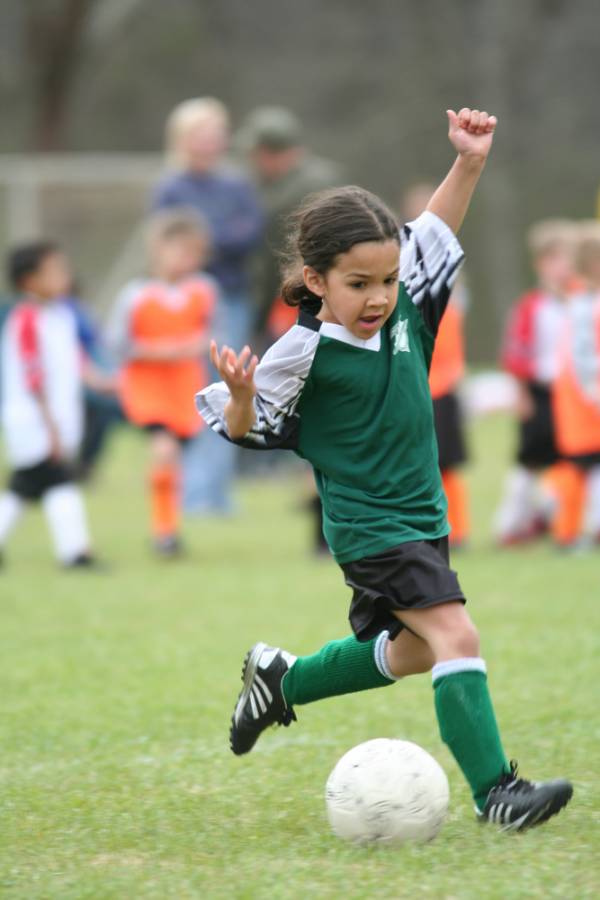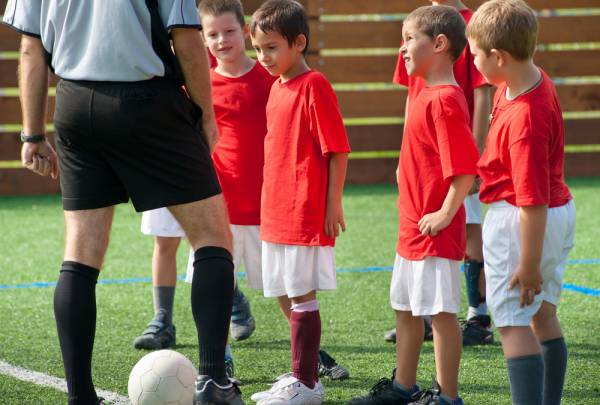You know that scary parent moment when you realize it’s just too quiet? You know, you’re caught up in something and all of a sudden you realize it’s silent, despite the fact you have two destructive toddlers in the house? It’s one of the most nerve-wrecking aspects of parenting, that question that never goes away, no matter how old your children are: what is my child doing when I’m not looking?
There’s another concern we parents may not always remember, and that is – what am I doing when my child is looking? After all, as the psychologist Carl Jung once said, “If there is anything that we wish to change in the child, we should first examine it and see whether it is not something that could better be changed in ourselves.” This applies to all areas of a child’s development, including fitness.
This fact hit home for me when I read this recommendation for coaches in Becca Borawski’s recent article on coaching kids: “…if you enroll the parents in the success of the child and in how you intend to achieve that success, parents can also be the best way for your coaching to reach far beyond the gym, into the family, and really change the course of multiple generations.” As a parent, reading that made me realize how important a role parents play in a child’s ‘fitness formation,’ even from a coach’s perspective. It’s pretty obvious, I guess. You hear athletes say things all the time like, “My first coach was my dad,” or “I started training in my backyard.” You also hear things like “Education starts at home,” or “Parents are a child’s first teacher” (I just heard that one at story time this week). This doesn’t only apply to academics – in the same way that parents are a child’s first teacher, they are also a child’s first coach.
I’ve definitely noticed this with my own young children. For example, my oldest daughter, who is three, watches my eating habits like a hawk. If I so much as touch something she’s not allowed to eat or that has been denoted as “yucky” or “unhealthy,” she kindly points it out for me. In a funny way, she really has a way of holding me accountable. She’s also  my fitness buddy. If I’m starting to drag after a long day at home of phone calls, chores, and work, she suggests we do a workout. Although a lot of that is just due to her spunky personality, I like to think it’s also due in part to things I’ve taught her during her short little life so far. It’s nice to see she pays attention, that the lessons I’ve tried to teach her are already starting to stick – but it’s also a constant challenge.
my fitness buddy. If I’m starting to drag after a long day at home of phone calls, chores, and work, she suggests we do a workout. Although a lot of that is just due to her spunky personality, I like to think it’s also due in part to things I’ve taught her during her short little life so far. It’s nice to see she pays attention, that the lessons I’ve tried to teach her are already starting to stick – but it’s also a constant challenge.
Then again, a parent will never be a coach in the same way that a coach is a coach. You hear people say, “Be a parent first, and a coach second.” Nevertheless, a parent’s fitness example is the first a child encounters, and is particularly important when children are very young and not quite old enough to participate in team sports or start more formal training. Although parent “coaching” may not be as technical as a coach in a gym or sports team, a parent’s example provides the first lessons in those important character traits that are so vital to developing an active and healthy lifestyle, like discipline, persistence, and consistency.
Of course, once a child is old enough to join a sports team with a “real” coach, the parental role takes a new direction. At this stage, the primary role of the parent is to stay in close dialogue with the coach in order to provide the necessary support for their child’s success.
Here are three things that parents (and coaches) should keep in mind at this point:
- Parents and Coaches Play Different Roles – Coaches and parents each have their own roles to play in a child’s athletic development. According to Gayle Shalloo, who has coached kids’ hockey for ten years and also coaches kids at CrossFit FullStrength here in Phoenix, “From my own experience I think it is the coach’s job to make sure that children are always getting positive reinforcement and having fun…I think it is the parent’s job to not push their children so far into a burnout state. Having a realistic expectation of a child’s ability can help keep everyone in a positive state of mind.” Danette “Dizzle” Rivera aptly described this role of the parent as a “razor’s edge”, which illustrates it perfectly. It can be hard to find that balance between encouraging a child and maintaining a realistic perspective, which is why staying in close dialogue with your child’s coach is absolutely essential.
- Each Role Has Something Unique to Offer -Parents should also realize a good coach offers something a parent may not be able to provide. As Shalloo notes, “As a coach it is our job to use our own experiences in fitness and sports to guide children. At times it is the parent’s first experience with that sport or fitness, so they are lacking the experience a coach
 has from years of participation. Children want to see a coach be able to demonstrate the skills needed to be successful in the gym or on the field. It helps the child see that their goals are attainable through hard work. Children view their parents as parents, so it is hard for them to take them out of that role.” Shalloo practices what she preaches here; she played Division I hockey in college and opened up CrossFit FullStrength in February 2010. A good coach is someone parents can entrust their children to as a model of athletic excellence as well as excellence of character.
has from years of participation. Children want to see a coach be able to demonstrate the skills needed to be successful in the gym or on the field. It helps the child see that their goals are attainable through hard work. Children view their parents as parents, so it is hard for them to take them out of that role.” Shalloo practices what she preaches here; she played Division I hockey in college and opened up CrossFit FullStrength in February 2010. A good coach is someone parents can entrust their children to as a model of athletic excellence as well as excellence of character. - Parents and Coaches Need a Foundation of Trust – The child-coach and child-parent relationship is obviously important, but so is the coach-parent relationship. As noted by Shalloo, “Parents need to have trust in a coach and know that we put thought into why we are doing what we do with these children, both in the gym and on the field. There is always a plan when dealing with children.” Once again, this is why choosing a good team and coach is crucial. If your child’s coach doesn’t seem trustworthy and knowledgeable, find a different one.
Remember that parent moment I talked about before, when it’s just too quiet? Letting your child go “out of your sight” and entrusting them to another person, whether it is a coach or teacher, is scary. As my daughter grows up, I already see her looking to other adults as an example, and I realize more and more how much I, as a parent, will have to entrust her to the care of others.
I may be her first coach and teacher, but I will certainly not be the only one. I will fall into the background so she can come into her own. But these foundational years have been amazing, and I’m ready to slowly surrender my position as “First Coach.” After all, there’s one role I’ll never lose, and that’s “Mom.”






